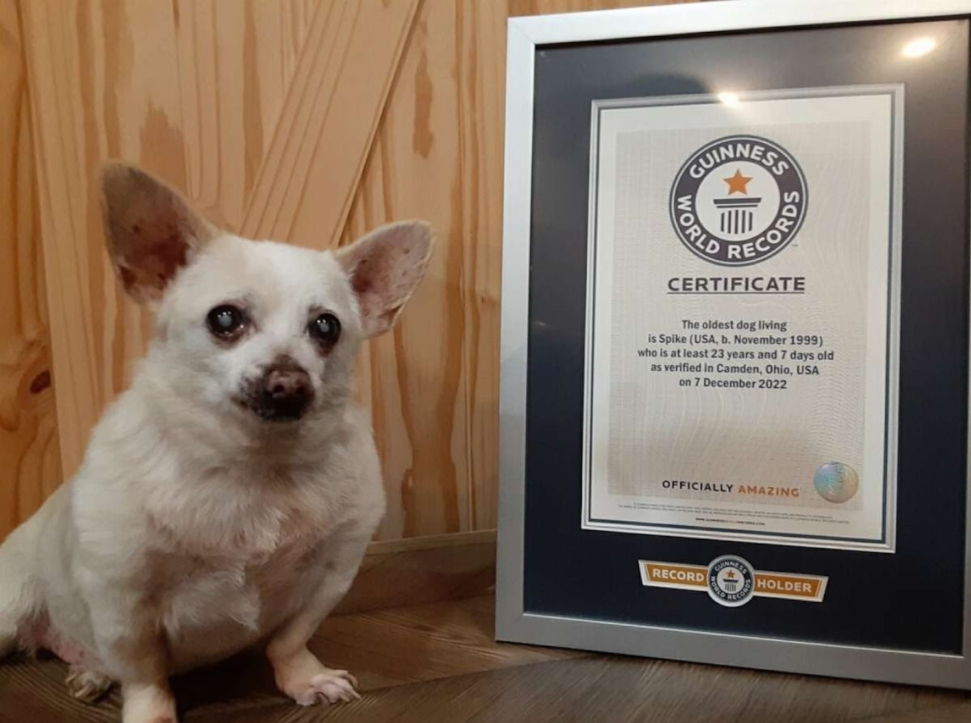Chihuahuas, known for their vibrant personalities and small size, are among the longest-living dog breeds. The average Chihuahua lifespan ranges from 12 to 18 years, with many reaching their 18th birthday and some even living into their 20s.
Their longevity makes them cherished companions for years, but like all pets, their lifespan depends on various factors, including genetics, diet, exercise, and healthcare.
In this post, we’ll explore what influences a Chihuahua’s lifespan and share tips to ensure your furry friend lives a long, healthy life.
How Long Do Chihuahuas Live?
Chihuahuas are not only known for their feisty personalities but also for their impressive longevity. With an average lifespan of 14 to 16 years, these small yet resilient dogs often outlive larger breeds by several years.
Remarkably, some Chihuahuas have been documented living into their early 20s, making them one of the longest-living dog breeds. Whether they’re ruling your home or curling up in your lap, Chihuahuas often enjoy a long, vibrant life filled with love and adventure.
Fun Fact: The oldest Chihuahua on record lived to be 20 years and 265 days old!

Chihuahua Lifespan In Human Years
Knowing your Chihuahua’s age in human years can give you a better perspective on their life stages and needs. On average, a 15-year-old Chihuahua is equivalent to a 76-year-old human. The conversion between dog years and human years varies based on size and breed, and small dogs like Chihuahuas tend to age slower compared to larger breeds.
| Chihuahua Age (Years) | Human Age Equivalent (Years) |
|---|---|
| 1 | 15 |
| 2 | 24 |
| 3 | 28 |
| 4 | 32 |
| 5 | 36 |
| 6 | 40 |
| 7 | 44 |
| 8 | 48 |
| 9 | 52 |
| 10 | 56 |
| 11 | 60 |
| 12 | 64 |
| 13 | 68 |
| 14 | 72 |
| 15 | 76 |
| 16 | 80 |
| 17 | 84 |
| 18 | 88 |
| 19 | 92 |
| 20 | 96 |
Teacup Chihuahua Lifespan
Teacup Chihuahuas, a smaller variety of the standard Chihuahua, are adored for their tiny size and cute appearance. However, their petite stature often comes with specific health challenges that can impact their lifespan. On average, a Teacup Chihuahua lives between 7 to 12 years, which is shorter than the lifespan of a standard Chihuahua (12 to 18 years).

Factors Influencing Teacup Chihuahua Lifespan
- Size-Related Health Issues:
- Their small size makes them more prone to injuries, such as fractures from minor falls.
- Teacup Chihuahuas often face difficulties regulating body temperature, leading to hypothermia.
- Genetic Conditions:
- They are more likely to suffer from congenital health issues like heart defects, hydrocephalus (fluid in the brain), and hypoglycemia (low blood sugar).
- Breeding practices to achieve their tiny size sometimes result in compromised genetics.
- Diet and Nutrition:
- Teacup Chihuahuas need a nutrient-dense diet to meet their energy requirements without overfeeding, as obesity can further shorten their lifespan.
Chihuahua Lifespan By Gender
The lifespan of a Chihuahua can vary slightly depending on gender, with females generally living longer than males. Proper care, genetics, and overall health play significant roles in determining their longevity.
Chihuahua Lifespan Male
Male Chihuahuas typically have a lifespan of 12 to 18 years. While they can live long and healthy lives, males may be more prone to certain health and behavioral issues that can impact their longevity.

Factors Affecting Male Chihuahua Lifespan:
- Health Issues: Male Chihuahuas may be more susceptible to joint problems, such as patellar luxation and heart conditions.
- Behavioral Tendencies: Males can be more territorial and prone to stress or aggression, which may affect their overall well-being.
- Neutering: Neutering can positively impact their lifespan by reducing the risk of certain cancers and behavioral issues.
Chihuahua Lifespan Female
Female Chihuahuas typically live 1 to 2 years longer than males, with an average lifespan of 14 to 18 years. Their longer lifespan is often attributed to fewer behavioral stressors and hormonal advantages.

Factors Affecting Female Chihuahua Lifespan:
- Health Advantages: Females are less prone to certain genetic conditions and may have stronger immune systems.
- Spaying: Spaying can increase their lifespan by reducing the risk of uterine infections, mammary tumors, and other reproductive health issues.
- Calmer Temperament: Female Chihuahuas are often less territorial and aggressive, which can lead to lower stress levels and better overall health.
At What Age Do Chihuahuas Start Having Health Issues?
Chihuahuas, like many small dog breeds, are generally healthy and long-lived, but they can often start developing health issues at various stages of their lives. While some problems may appear early due to genetics, others tend to emerge as they age.
Dental disease is one of the most common health issues in Chihuahuas, affecting more than 80% of them before the age of two. Their small heads and compact jaws often lead to teeth overcrowding, which creates the perfect environment for plaque and tartar buildup. Here’s a breakdown of when Chihuahuas may start experiencing health issues:
1. Early Life (Puppy Stage: 0–1 Year)

- Hypoglycemia (Low Blood Sugar): This is a common issue in Chihuahua puppies due to their small size and high metabolism. It can occur if they go too long without eating.
- Dental Problems: Chihuahuas are prone to dental issues, which can start as early as puppyhood due to their small mouths and crowded teeth.
- Patellar Luxation: Some puppies may show signs of this knee joint condition early on, especially if it’s genetic.
2. Young Adulthood (1–4 Years)

- Dental Disease: By the age of 2–3, many Chihuahuas begin to show signs of dental issues, such as tartar buildup, gum disease, or tooth decay.
- Tracheal Collapse: This condition, characterized by a weakened windpipe, can start to manifest in young adulthood, especially if the dog is exposed to stress, obesity, or excessive pulling on a collar.
- Allergies: Skin or food allergies may become noticeable during this stage.
3. Middle Age (5–9 Years)

- Heart Problems: Conditions like mitral valve disease or heart murmurs may start to develop as Chihuahuas reach middle age.
- Obesity: Without proper diet and exercise, Chihuahuas can become overweight, leading to joint problems, diabetes, and other health issues.
- Eye Problems: Conditions like cataracts or dry eye may begin to appear during this stage.
4. Senior Years (10+ Years)

- Arthritis: Joint issues, including arthritis, are common in older Chihuahuas due to their small size and fragile bones.
- Dental Disease: If not correctly managed, dental problems can worsen and lead to infections or tooth loss.
- Cognitive Decline: Senior Chihuahuas may experience cognitive dysfunction, similar to dementia in humans, which can affect their behavior and memory.
- Organ Issues: Kidney, liver, or heart disease may become more prevalent as they age.
What Is The Leading Cause Of Death In Chihuahuas?
Heart failure, mainly due to valve deterioration, is one of the leading causes of death in Chihuahuas, especially as they enter their senior years. In fact, 75% of heart disease in Chihuahuas is caused by mitral valve disease (MVD), a condition where the heart’s mitral valve degenerates, leading to improper blood flow and eventual heart failure.
Why Is Heart Disease Common In Chihuahuas?
Mitral Valve Disease (MVD) occurs in Chihuahuas when the mitral valve, which separates the left atrium and left ventricle of the heart, becomes thickened and fails to close correctly. This allows blood to leak backward, reducing the heart’s efficiency. The following are the reasons why their heart weakens as they grow old.
- Genetic Predisposition: Chihuahuas are genetically prone to mitral valve disease, which is the most common form of heart disease in small dog breeds.
- Aging: As Chihuahuas age, the wear and tear on their heart valves can lead to deterioration, making older Chihuahuas more susceptible.
- Small Size: Their small size and delicate physiology make them more vulnerable to heart-related issues compared to larger breeds.
Conclusion: Protect Your Chihuahua’s Tiny Heart, And They’ll Cherish You For Life!
Although Chihuahua’s lifespan is influenced by a lot of factors like diet, exercise, genetics, etc., they are among the longest-living dog breeds with an average lifespan of 12 to 20 years.
If you have a chihuahua as a pet or want to keep one, you should focus more on providing a well-balanced diet, regular health checkups, and a safe environment to increase your Chihuahua’s lifespan.
FAQs
Indoor Chihuahuas typically live 12–18 years, with some reaching 20+ years under optimal care.
Female Chihuahuas often outlive males by 1–2 years, averaging 14–18 years versus males’ 12–16 years.
At 13, a Chihuahua is considered a senior but not exceptionally old. Many live to 15–18 years, so 13 is akin to a human in their late 60s.
Chihuahuas are often euthanized due to a combination of health and behavioral issues. Untreated health problems, such as heart disease, dental infections, or congenital defects like hydrocephalus, can become severe and unmanageable.
